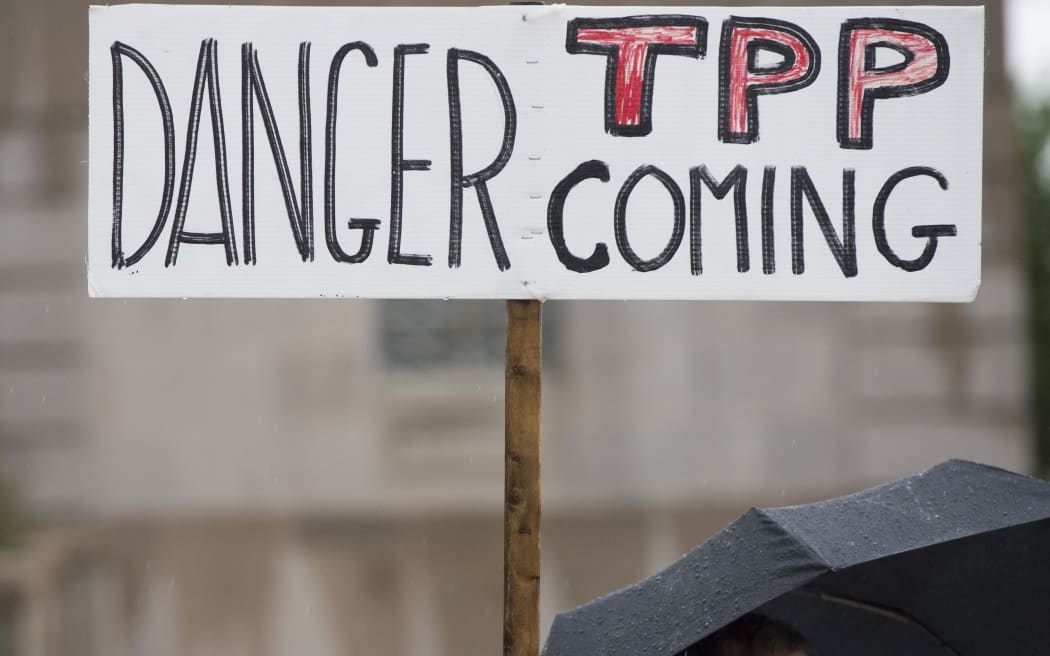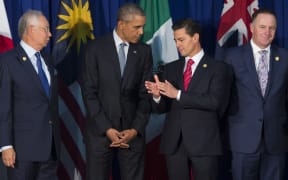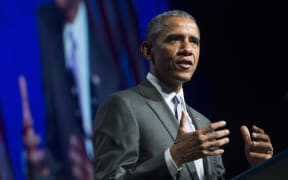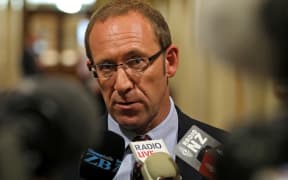New Zealand will be more vulnerable to legal attacks from foreign investors under the investment chapter in the Trans Pacific Partnership (TPP) agreement, opponents say.

An anti-TPP protest in Washington DC, earlier this year. Photo: AFP
More than 6000 pages of the controversial TPP agreement were released last month, including the investment chapter.
New York University law professor Jose Alvarez said the United States got its way.
"By some studies that have just been done, 82 percent of the language in the investment chapter is straight out of the US latest treaties, the US-Colombia FTA for example."
So while it meets the US's gold standard, what does it mean for New Zealand?
A peer-reviewed analysis by University of Auckland investment law expert Amokura Kawharu, found foreign investors will enjoy greater protections in New Zealand than in previous trade deals.
While supporters and opponents agreed on that, the magnitude of the changes on the government's right to regulate remained in dispute.

University of Auckland professor and TPP critic Jane Kelsey in RNZ's Auckland newsroom. Photo: RNZ / Kim Baker Wilson
TPP critic, Auckland University law professor Jane Kelsey, said people should be very worried, as it confirms long held fears that New Zealand will have less control over its destiny.
"There are specific new provisions in here, including the ability of a foreign investor to use the contentious investor state dispute settlement (ISDS) process when there is a dispute around an investment agreement such as a mining concession or a PPP contract, even if that's not provided for in the contract itself."
Under the ISDS provision, which gives foreign investors the power to sue the government for introducing legislation that harms their investment, unaccountable international tribunals will increasingly decide New Zealand's fate when investors sue the government, Professor Kelsey said.
The three arbitrators, who are hand-picked by the parties, don't have to refer to precedent and the decisions are not open to appeal.
"These investment tribunals, which are notoriously pro-investment, interpreted through that lens, rather than putting primacy on the interests of New Zealanders, whether its environment policy, health policy or other public policy objectives. (They) are a rule onto themselves."
The Europeans are taking a different approach in their trade talks with the Americans, and are proposing a separate investment court with an appeals process, she said.
Chapman Tripp partner Daniel Kalderimis, who peer-reviewed the analysis, doesn't believe the changes are as chilling as its detractors make out.
The core of the chapter, set out by the minimum standard of treatment of foreign investors, has tightened the safeguards around the government's right to regulate.
"The wording there is more restrictive, and thereby more protecting of state's regulatory interest than in some of our previous chapters."
University of Sydney law professor Luke Nottage agreed, adding that the burden of proof lay with the investors.
New Zealand has little to fear from litigious investors if the American experience of ISDS was anything to go by, Professor Nottage said.
"We have to remember the US has never lost an investor claim. It's successfully defended many under their FTAs .... which suggests that New Zealand and Australia and other developed countries at least should be able to avoid trouble."
Supporters also argued that while New Zealand was giving up some sovereignty, the gains from being in a trade pact encompassing 40 percent of world trade were worth the price.






